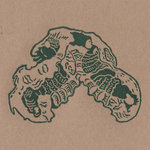
by Ian Mann
July 19, 2022
/ ALBUM
The addition of electronics has provided extra depth, colour and texture to the duo’s sound, but without diluting the essential rawness of Ripsaw Catfish’s music.
Ripsaw Catfish
“Carapace”
(Raw Tonk Records RT060)
Anton Hunter – guitar, effects, Cath Roberts – baritone saxophone, electronics
Ripsaw Catfish is the long running duo of Manchester based guitarist Anton Hunter and London based saxophonist Cath Roberts.
Released on saxophonist Colin Webster’s Raw Tonk record label “Carapace” represents their third album for the imprint following “For The Benefit Of The Tape” (2014) “Namazu” (2017).
Besides their work as a duo Hunter and Roberts have been regular collaborators in other ensembles such as Hunter’s large ensemble Article XI and Roberts’ quintet Sloth Racket, plus the extended ten piece version Favourite Animals.
Both have also led numerous other projects as well as collaborating with a wide range of musicians from the UK and continental Europe. Each has featured many times on the Jazzmann pages many times in a variety of musical contexts.
Ripsaw Catfish is an ensemble that describes itself as “exploring improvised and composed music and the spaces in between”. The “Carapace” album was recorded during the course of a single day in September 2021 at The Wood Rooms in Salford with Hunter undertaking engineering duties alongside the estimable Alex Bonney, who mixed and mastered the album. The album packaging features the lino-cut artwork of Webster.
Cath Roberts says of this latest Ripsaw Catfish recording;
“We’ve integrated my electronics into the duo sound and things have taken an exciting turn as a result. We’re both really proud of this album!”
During lockdown the duo had been forced to collaborate online. These remote sessions saw Roberts experimenting with table top electronics in addition to playing saxophone, something that she also does as part of her duo collaboration with fellow saxophonist Sam Andreae. These online experiments were to influence the eventual “Carapace” recording session.
The new album features six pieces, presumably named post performance, all with titles referencing the overall “Carapace” theme.
Album opener “Desiccate” commences with the sound of clangorous guitar and ominous electronics, helping to give the music a menacing feel, something subsequently enhanced by the belligerent wail of Roberts’s baritone sax. Hunter’s crashing power chords cross Tony Iommi with Marc Ducret, but the music later takes a more abstract turn with Roberts’ electronics combining with her own baritone sax and Hunter’s guitar effects to generate an eerie, but still subtly threatening ambience. It’s a compelling and impressive start.
“Skitter” unfolds over the course of nearly eleven minutes and again finds the duo generating an extraordinarily broad range of sounds. The band is well named, even in its quietest moments Ripsaw Catfish possesses an abrasive quality, something embodied by Hunter’s jagged guitar and Roberts’ unsettling electronics. Indeed it’s this aspect of her playing that represents her main focus on this album, this is now far more than just a ‘sax and guitar’ duo. Nevertheless the appropriately restless “Skitter” does eventually embrace some harsh baritone sax blasting alongside the guitar crunch and electronic crackle. Hunter again deploys his guitar effects skilfully, again helping to create an ambience that is both threatening and strangely beautiful, evoking images of both the ocean depths and of deep space.
“Shells and Scales” emerges from Hunter’s guitar percolations to embrace swirling electronics and eventually piercing baritone sax, the mood of the piece becoming more sinister and frenzied as it progresses.
Initially “Dust Crunch” is as harsh and uncompromising as its title suggests, commencing with the sound of over-driven guitar and rarely letting up in terms of intensity as sax and electronics are added to the mix. The piece is a tour de force for Hunter who wrings an extraordinary range of sounds out of his axe, aided and abetted by Roberts’ electronics and baritone sax blasting. The piece then mutates into a passage of pure electronica before a coda featuring sax and guitar that sounds almost conventional in comparison to what has gone before.
Unadorned guitar and sax also introduce “Mother of Snails”, the piece gradually becoming more ambient as it progresses as guitar effects and electronics are gradually introduced. It’s the least confrontational track on the album as the duo create a drifting atmosphere possessed of a fragile beauty.
The title track, “Carapace”, continues the ambient feel of “Mother of Snails” with Roberts’ sax playing a more dominant role and sketching out a shadowed line underscored by Hunter’s guitar atmospherics. The mood becomes darker as the piece progresses and Hunter’s playing becomes more abrasive, creating a clangorous wall of sound behind the sax.
I have to say that I very much enjoyed the music on this album. The addition of Roberts’ electronics has provided extra depth, colour and texture to the duo’s sound but without diluting the essential rawness of Ripsaw Catfish’s music. Between them Hunter and Roberts generate an extraordinary array of sounds as they shift effortlessly between moods and dynamics. Bonney does an excellent job of capturing the nuances and sonic details of the music and is an important component in the creative process.
I recall hearing “For The Benefit Of The Tape” back in the day but missed out on “Namazu”. Nevertheless I’d suggest that “Carapace” is Ripsaw Catfish’s most satisfying release thus far and whilst it won’t be to everybody’s taste fans of improvised music and adventurous listeners in general should find much to enjoy here. After nearly a decade of making music together Hunter and Roberts have established an impressive rapport that is apparent throughout this recording.
On the evidence of “Carapace” this is a duo that I’d very much like to see performing live.
blog comments powered by Disqus